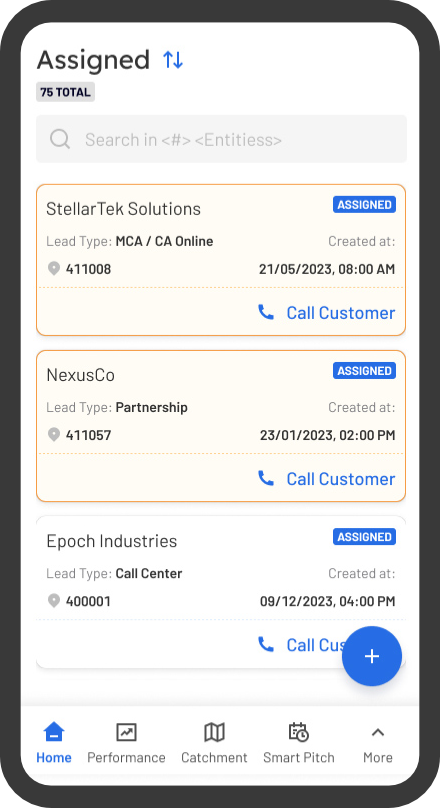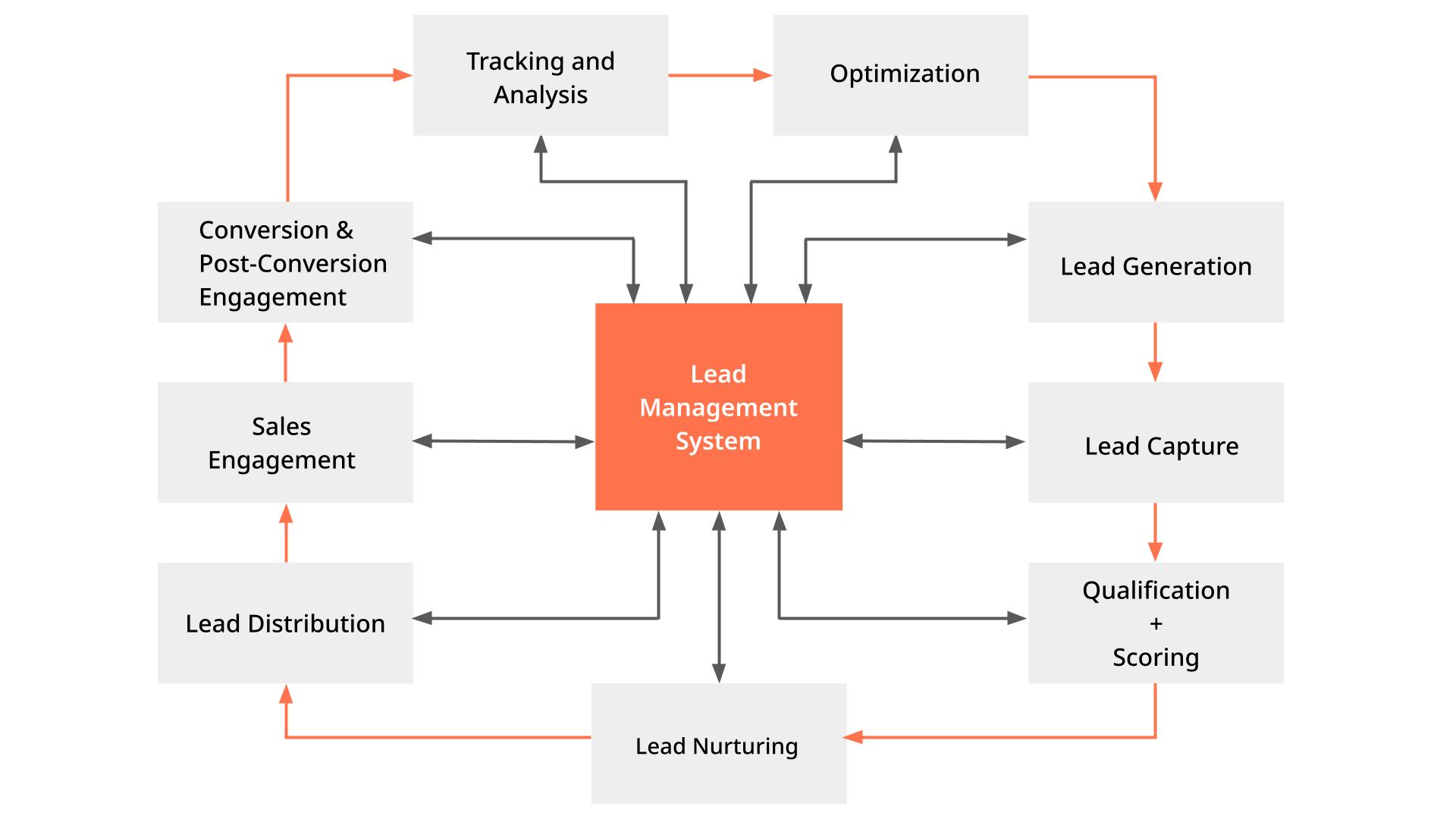What is Lead Management?
Lead management refers to the systematic process of acquiring, tracking, nurturing, and converting potential customers (leads) into actual sales or clients. It involves strategies and tools to capture leads, qualify their interest, and guide them through the sales funnel. This includes activities like lead generation, scoring, nurturing, and routing to appropriate sales teams. Effective lead management optimizes resource allocation, enhances communication, and increases the likelihood of successful conversions, ultimately driving business growth.

What is a Lead Management Process?
The lead management process is a structured approach businesses follow to effectively handle potential customers or leads from initial contact to becoming paying customers.
Here’s a general outline of the lead management process:

- Lead Generation: This is the initial phase where leads are generated through various means like website forms, social media engagement, webinars, events, or content downloads.
- Lead Capture: The gathered leads are stored in a centralized database, often a Customer Relationship Management (CRM) system, where their information is recorded and organized.
- Lead Qualification and Scoring: Leads are evaluated and scored based on their demographics, engagement level, and behavior. This process helps prioritize leads and identify those most likely to convert.
- Lead Nurturing: Through targeted and personalized content, emails, and communication, leads are nurtured over time to build relationships, educate them about the offerings, and address their concerns.
- Lead Distribution: Qualified leads are assigned to the appropriate sales or marketing teams for further engagement. This ensures that each lead receives the necessary attention based on their characteristics and needs.
- Sales Engagement: Sales representatives interact with the leads, addressing their specific requirements, providing more detailed information, and guiding them through the buying process.
- Conversion & Post-Conversion Engagement: Ideally, the engaged leads become customers by purchasing or committing to a desired action, completing the conversion process. After conversion, ongoing customer communication continues to nurture the relationship, encourage repeat business, and potentially gather referrals.
- Tracking and Analysis: Throughout the process, data is collected and analyzed to evaluate the effectiveness of various strategies and identify areas for improvement.
- Optimization: Based on the insights gained from tracking and analysis, the lead management process is tweaked and optimized to enhance efficiency, increase conversion rates, and improve customer satisfaction.
By following this systematic lead management process, businesses can maximize the value of their leads, improve customer relationships, and ultimately drive revenue growth.
Also Read: How to Create a Successful Lead Management System for BFSI
Importance of Having Lead Management Software
Lead management software is crucial for businesses to streamline their lead lifecycle management activities. Let’s learn why you need lead management software.
- Centralized Data Storage: Lead management software provides a centralized database to store all lead-related information, making it easily accessible to various teams and ensuring data consistency.
- Efficient Lead Tracking: It allows you to track the entire lead journey, from initial contact to conversion, providing insights into lead behavior and interactions with your business.
- Lead Segmentation: Lead management software enables you to categorize and segment leads based on attributes and behaviors, which helps in targeted and personalized communication.
- Lead Scoring: Automated lead scoring within the software ranks leads based on their engagement level and likelihood to convert, allowing sales teams to prioritize their efforts.
- Automated Nurturing: The software facilitates automated lead nurturing through personalized emails and content, ensuring consistent engagement and relationship-building.
- Workflow Automation: It streamlines processes, automates repetitive tasks, and ensures leads are routed to the right teams or individuals at the right time.
- Better Collaboration: Lead management software enhances collaboration between marketing and sales teams by providing a unified platform for communication and lead handoff.
- Improved Conversions: By providing insights into lead behavior and preferences, the software helps tailor interactions, leading to higher conversion rates.
- Data Analysis: The software offers analytics and reporting features that allow you to assess the effectiveness of your lead generation and nurturing strategies, helping you refine your approach.
- Scale and Growth: Managing leads manually becomes challenging as your business grows. Lead management software scales with your business, ensuring efficient lead handling.
- Personalization: It enables you to deliver personalized experiences by tracking lead interactions and tailoring communications based on their preferences.
- Data Security and Compliance: Many lead management software solutions offer data security features and comply with regulations like GDPR, ensuring your lead data is handled responsibly.
Lead management software optimizes lead engagement, streamlines processes, improves collaboration and enhances overall efficiency in converting leads into customers. It’s a valuable tool for businesses seeking to maximize their sales and growth potential.
Also Read: Leading Retailer Improves Lead Management and Digitizes Customer Onboarding
How Can Companies Benefit from Effective Lead Management?
Effective lead management offers numerous benefits to companies. Here are the key benefits of lead management.
- Higher Conversion Rates: Lead management processes ensure that leads are nurtured and effectively engaged, increasing the chances of conversion into paying customers.
- Optimized Resource Allocation: Companies can focus their efforts and resources on leads with higher conversion potential, saving time and money.
- Improved Sales-Ready Leads: Lead scoring and qualification help identify leads ready for direct sales engagement, resulting in more productive interactions.
- Enhanced Customer Engagement: Personalized and timely interactions foster stronger relationships, improving customer satisfaction and loyalty.
- Shortened Sales Cycle: Well-nurtured leads are more informed and likely to make faster purchase decisions, reducing the overall sales cycle length.
- Better Collaboration: Effective lead management fosters alignment between marketing and sales teams, leading to smoother handoffs and improved communication.
- Data-Driven Insights: Analytics from lead management software provide insights into lead behavior, helping refine strategies and improve targeting.
- Increased Revenue: Businesses experience higher revenue and growth potential by converting more leads into customers.
- Customer Segmentation: Lead management allows for precise segmentation, enabling companies to tailor their messaging and offerings to specific customer groups.
- Long-Term Relationship Building: Continued post-conversion engagement maintains relationships, encouraging repeat business and referrals.
- Enhanced Brand Perception: Thoughtful and personalized engagement throughout the lead management process enhances the brand’s reputation.
- Scale and Growth: Scalable lead management processes accommodate increased lead volumes as the business grows.
- Continuous Improvement: Regular analysis of lead management performance allows for ongoing optimization of strategies and tactics.
Effective lead management boosts efficiency, revenue, customer satisfaction, and competitiveness, making it a crucial aspect of modern business strategies.
Lead Management Best Practices
Here are some lead management best practices to help businesses effectively handle potential customers and drive successful conversions.
- Clear Lead Definition: Define what constitutes a lead for your business. Clear criteria will prevent confusion and ensure consistent lead management.
- Effective Lead Scoring: Develop a lead scoring system that assigns values based on lead attributes and behaviors. This helps prioritize high-potential leads for immediate attention.
- Detailed Buyer Personas: Create detailed profiles of your ideal customers to better tailor your interactions and content to their preferences and needs.
- Automated Lead Capture: Utilize website forms, landing pages, and chatbots to capture leads automatically and integrate them into your lead management system.
- Quick Response Time: Respond promptly to leads’ inquiries and actions. Research shows that timely responses significantly increase conversion rates.
- Personalized Nurturing: Tailor your communications to individual leads using their name, preferences, and past interactions for a more personalized experience.
- Segmentation Strategy: Group leads into segments based on demographics, behaviors, interests, and where they are in the buyer’s journey. This enables targeted and relevant content.
- Lead Nurturing Campaigns: Develop automated drip email campaigns that provide valuable content to leads over time, addressing their pain points and educating them.
- Multi-Channel Engagement: Engage leads through various channels, including email, social media, webinars, and events, to increase touchpoints and build relationships.
- CRM Integration: Use a Customer Relationship Management (CRM) system to manage leads, interactions, and sales processes in one centralized place.
- Sales and Marketing Alignment: Foster collaboration between sales and marketing teams through regular meetings, shared goals, and open communication.
- Lead Handoff Protocols: Establish clear procedures for transferring leads from marketing to sales, ensuring a seamless transition and consistent follow-up.
- Lead Recycling: Not all leads convert immediately. Implement a system to recycle leads back into nurturing campaigns for future opportunities.
- Continuous Monitoring and Analysis: Regularly review lead management metrics and analyze what’s working and what needs improvement, then adjust your strategies accordingly.
- Testing and Optimization: Experiment with different lead nurturing strategies, subject lines, content formats, and CTAs to identify what resonates best with your leads.
- Lead Data Hygiene: Keep your lead database clean by regularly verifying contact information and removing duplicates or outdated entries.
- Mobile Optimization: Ensure that your lead management processes are mobile-friendly, as many leads engage with content and emails on their mobile devices.
By implementing these best practices, businesses can create a systematic and efficient lead management process that maximizes conversions and customer satisfaction.
5 Key Lead Management KPIs
Lead management is a critical aspect of sales and marketing processes. Monitoring key performance indicators (KPIs) can help measure the effectiveness of lead generation, nurturing, and conversion efforts. Here are five crucial lead management KPIs:
- Lead Conversion Rate: This KPI measures the percentage of leads successfully converted into customers. It provides insights into the quality of leads generated and the efficiency of the sales process. Formula: (Number of Converted Leads / Total Number of Leads) * 100.
- Lead Velocity Rate: This metric tracks how leads move through the sales funnel. It measures the increase or decrease in the number of leads over a specific period, helping to forecast future sales performance. Formula: ((Current Month’s Leads – Previous Month’s Leads) / Previous Month’s Leads) * 100.
- Lead-to-Sales Cycle: This KPI calculates the average time it takes for a lead to move through the entire sales cycle, from initial contact to becoming a customer. A shorter cycle indicates higher efficiency in converting leads. Formula: Total Sales Cycle Time / Number of Converted Leads.
- Lead Source Effectiveness: This metric assesses the performance of different lead generation sources (such as social media, email campaigns, websites, referrals, etc.) in terms of their contribution to generating high-quality leads. It helps allocate resources effectively to the most productive channels.
- Lead Follow-Up Time: This KPI measures how quickly sales representatives respond to incoming leads. A fast response time is crucial for nurturing leads and preventing potential customers from losing interest. It’s often measured in minutes or hours, from when a lead is generated to when a representative makes contact.
These KPIs provide a comprehensive view of your lead management process, from initial generation to conversion. By monitoring and analyzing these metrics, you can identify areas for improvement, optimize your lead nurturing strategies, and ultimately enhance your overall sales performance. Remember that the KPIs most important to your business may vary based on your industry, target audience, and sales process.
Also Read: 6 Key Field Sales KPIs Sales Leaders Should Monitor
Best Lead Management Tools
- Dista Sales: Dista Sales, a comprehensive field sales management software, leverages location intelligence to improve sales productivity and expand sales coverage. The tool has several other offerings, including lead management, sales enablement, territory planning, and more.
- HubSpot: HubSpot provides a comprehensive suite of marketing, sales, and customer service tools, including lead tracking, automation, and analytics.
- Salesforce: Salesforce is a leading CRM platform with robust lead management features, such as lead tracking, opportunity management, and workflow automation.
- Pipedrive: Pipedrive simplifies sales processes with visual pipelines, contact management, and activity tracking for effective lead management.
- Freshsales: Freshsales is a CRM system with lead management capabilities, email tracking, and automation, aiming to streamline the sales process and enhance lead engagement.
Final Thoughts
When selecting a lead management tool, consider your business’s unique requirements, industry, integration needs, and budget. Explore user reviews, take advantage of free trials, and assess how well a tool aligns with your organization’s evolving lead management needs.
Looking for a powerful tool to streamline your field sales management? Get in touch with us for a free demo and learn more about our AI-enabled product suite.






